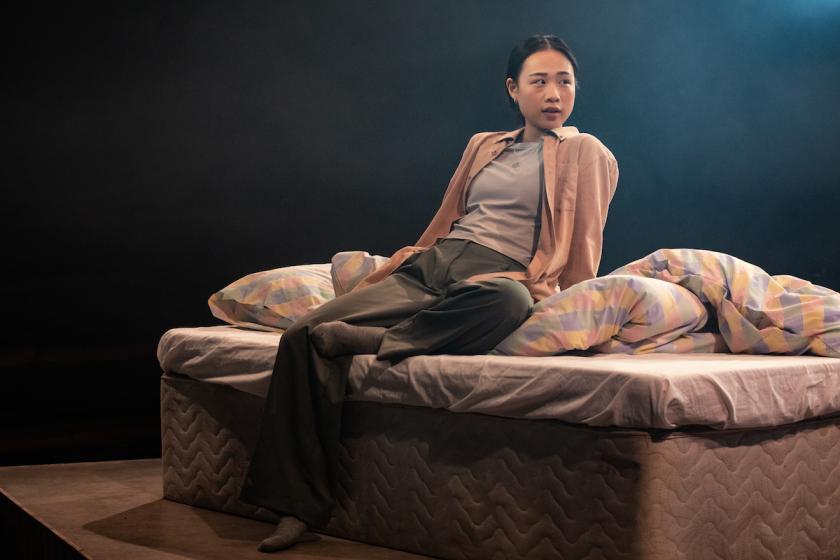Is new writing becoming increasingly literary? Recently, some of the language being used by younger playwrights seems to me to be becoming too subtle, something to be savoured on the page rather than strongly felt in live performance. Certainly, this is true of Ava Wong Davies’s Graceland, which was a winner of the 2022 Ambassador Theatre Group Playwright’s Prize, having been developed as part of an Introduction to Playwriting group at the Royal Court, where it gets a studio production. Although this 75-minute monologue has moments of perception and beauty, it is more writerly than raw.
The reason that I find this odd is that this is a story about an abusive relationship, where you’d expect flayed feelings and open wounds. Instead, the love affair between Gabriel, a poet from a posh white background, and Nina, a young British Chinese receptionist, is told with a subtlety and restraint that seems at odds with the experience of its teller. So what happens? After meeting at a friend’s barbecue, the rather gauche Nina falls in love with the rather aloof Gabriel (it’s a class thing) and the relationship very slowly starts to go sour. Realistically, there are many small warning signs, but nothing very definite until an explosive moment towards the end of the show.
What comes across very well in Wong Davies’s writing is the man’s desire for control, his use of generosity with money as a demonstration of his power, his ability to offer living space and a trip to visit his parents in their comparatively lavish home, his confidence in meeting her folks and his linguistic ability to gaslight her. It’s the kind of coercive control in which sex is used as power: she says that fucking “feels good”, but at the same time “It’s just like I’m not there”. She hasn’t exactly refused consent, but it still feels wrong. When her best friend Sam suggests that she report him, her response is to think, “And say what?”, then out loud: “I’m tired.”
Of course, the problem with the male use of power as domination in a relationship is that the victim not only feels powerless, but also in denial. Nina believes in love at first sight; she wants this love affair to work. When it doesn’t it takes her a long time to reconcile herself to this truth. In the end, it’s only an overt act of aggression that convinces her, and even then she replays this incident in three different ways in her mind. Her sensation of falling, of living on a cliff edge, of feeling in danger, is quietly and sincerely expressed. What’s lacking is any sense of drama.
We are, instead, deep inside Nina’s well-controlled mind. She remembers details of growing up, her mother smacking her for sucking her thumb at the age of nine, and the way that her father – who runs a Chinese restaurant – doesn’t want her to inherit the place. Although Gabriel, ever the poet, suggests that she should try writing, she refuses to do that. Which seems in flat contradiction to the literary quality of this monologue, with its focus on telling details, and its thematic use of the colour red: red wine, red blood, red wounds, red faces, red tomato sauce. Listening to this is like listening to a beautifully crafted story – but where is the pain?
Okay, there are a few tears, but if you blink you’ll miss the bruises. Instead there is a distant feeling, a sense of desolation a long way away, as if all this is happening to another person. But I wished that Nina could tell us what she has told Sam so that we could more directly empathise, instead of just picking up a far away vibration of an experience. Here the smoothness and perfection of the writing seem at odds with the central emotions of the story. So, although the playwright’s use of alternate first and second person narrative is exciting at the start, it once again increases our distance because of its explicit literariness.
Wong Davies is an experienced arts writer, and I have enjoyed her piercing theatre reviews in the past, but the over-polished style of Graceland, whose title is a typically puzzling aspect of the show, is emphasised by an aptly cool production by director Anna Himali Howard, with Izzy Rabey. Sabrina Wu’s performance is as low key and subtle as the text itself, creating a sense of dread without histrionics, although Mydd Pharo’s set, a bed surrounded by mounds of mud, is used perhaps too literally to suggest the sensation of being dirtied by experience. But somehow I would have preferred it if the text had been equally mucky, less literary and more direct.















Add comment